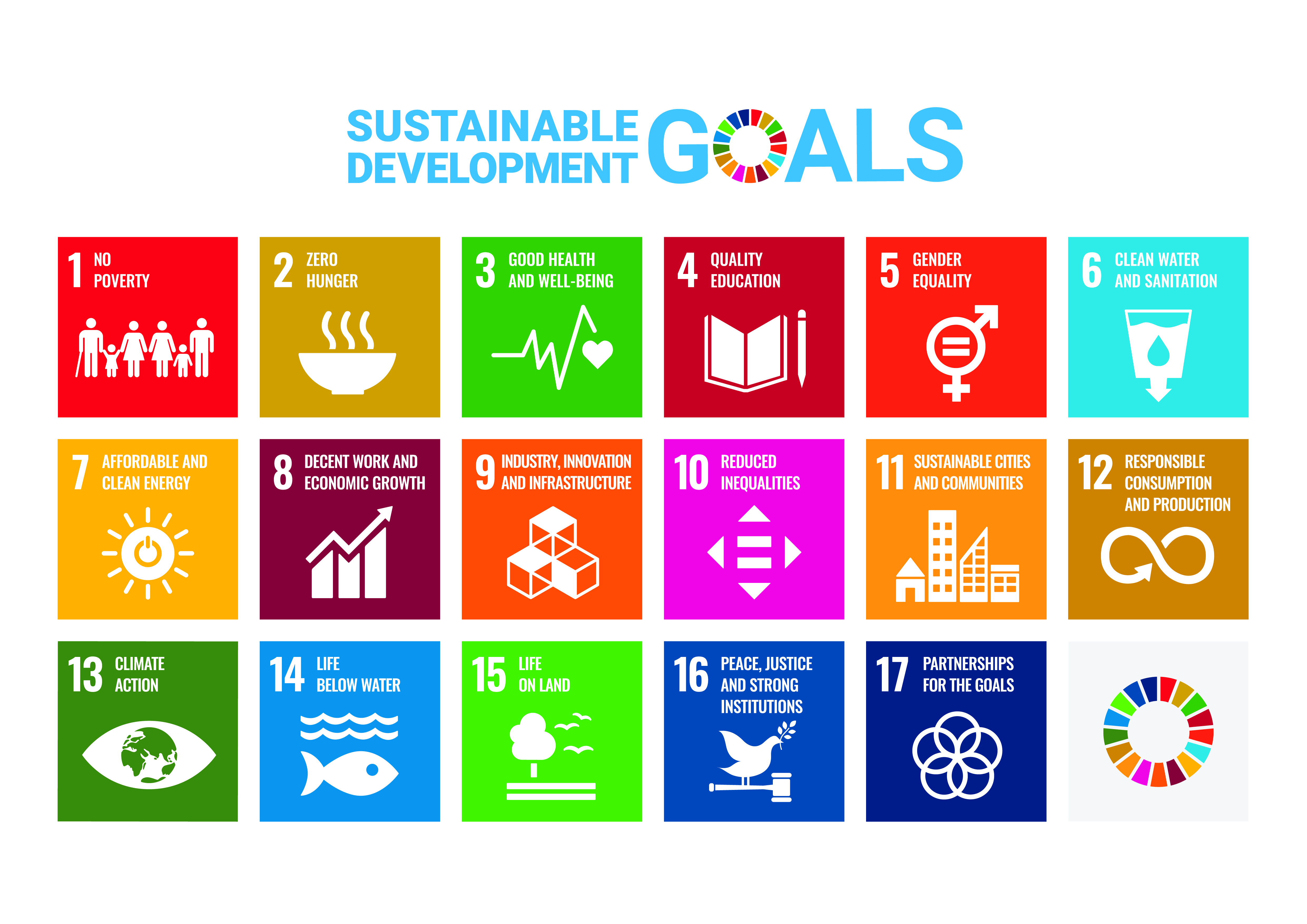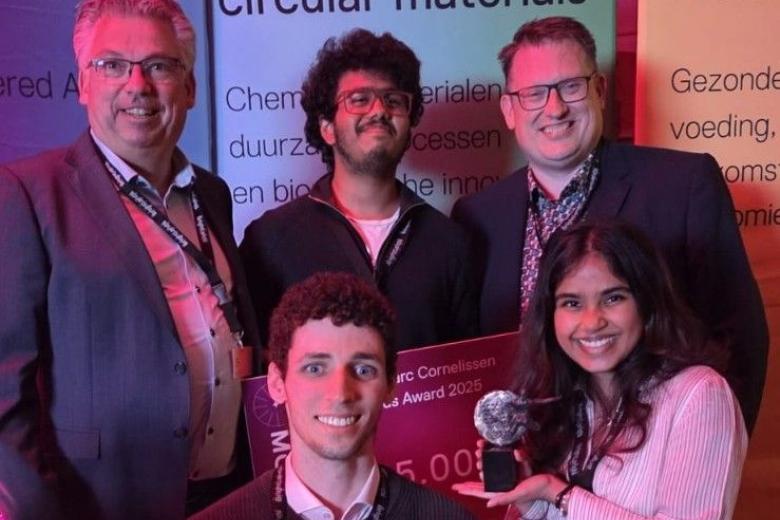SBE launches three spearhead initiatives to tackle the Sustainable Development Goals
2030 marks the year by which the UN member states have committed to delivering their 17 Sustainable Development Goals (SDGs). These goals deal with social, economic and environmental issues, making up a collective blueprint of peace and prosperity for humankind and the planet. 2030 also marks an important year for our world’s climate: research has shown that in order to avoid catastrophe, it is critical that significant efforts be made to keep the global temperatures from rising by more than 1.5-2 °C.
With 9 years remaining to deliver on the SDGs and to get climate change under control, the world has made some progress, but there is still a long way to go. Not only are we currently reeling from the effects of the COVID-19 pandemic, but millions of people are also still living in extreme poverty, and targets to protect climate and biodiversity are significantly off track.

Taking action for sustainable development
As a faculty committed to having a positive impact on the world, the School of Business and Econimics (SBE) believes that one of its main responsibilities is to rise to the occasion, contributing its resources and expertise toward solving critical challenges faced by our global community. To help achieve its mission, SBE recently launched three Spearhead initiatives focused on themes that are integral to the SDGs: sustainable development, digitalisation, and globalisation. The aim of these Spearheads is to develop cutting-edge research and provide innovative perspectives to society, contributing to the development of solutions for some of the world’s most pressing problems.
In order to select the three Spearheads, SBE first launched a call to its community of researchers. After a careful selection process, the following three initiatives were chosen in December 2020:
- UM Behavioural Insights Centre (UM-BIC);
- Fair and Smart Data for sustainable global value networks: transparency and traceability as game-changer (FSD); and
- Maastricht Observatory on Resilient, Responsible and Sustainable Society, Economy and Enterprise (MORSE).
If you want to find out more about how the three spearhead projects are related to SBE's strategy for 2025, check out SBE's strategy video.
Meet the three SBE Spearheads
1. UM Behavioural Insights Centre (UM-BIC)
'With our expertise in human decision-making, the goal of our spearhead is to generate insights in order to address societally relevant questions together with policy makers and managers.' – Peter Werner, Associate Professor Microeconomics & Public Economics
UM-BIC's mission:
In the presence of ongoing situations such as the climate crisis and the COVID-19 pandemic, it is essential to better understand how human behaviour influences society’s ability to adapt. Despite widespread promotion of healthy lifestyles, people continue to engage in unhealthy habits such as junk-food consumption and cigarette smoking—ultimately causing huge costs to themselves and society. Although awareness of the climate crisis is becoming ubiquitous, both consumers and corporations do not sufficiently consider the negative social and environmental effects of their choices, preventing society from effectively addressing this crisis. Moreover, disparities in income, wealth, and education among citizens lead to the persistence of unequal opportunity and discrimination.
These are just a few reasons why reliable scientific insights regarding human behaviour can help government and corporate leaders develop more appropriate solutions for sustainable development, digitalisation and globalisation challenges.
This Spearhead will establish the UM Behavioural Insights Centre, based on an existing community of more than 40 scholars interested in behavioural research. Through interdisciplinary collaboration and the continual expansion of a partner network including public institutions and corporations, UM- BIC will provide valuable interdisciplinary insights by facilitating collaboration between various departments at SBE, UNU-MERIT, and many other UM faculties and institutes. Its long-term goal is to become a leading information source in Behavioural Policy Design in the Netherlands, for both national and international stakeholders.
Examples of planned research and activities:
UM-BIC plans to begin its work with five flagship interdisciplinary research projects, each focusing on topics directly related with the UN SDGs, including but not limited to: cognitive and behavioural underpinnings of economic decision making, poverty alleviation in Dutch communities, and the creation of sustainable organisations. In addition, it intends to organise grant programs, engage in social outreach and knowledge dissemination, and organise events linking faculties, research, and society.

2. Fair and Smart Data for sustainable global value networks: transparency and traceability as game-changer (FSD)
‘From data to joint knowledge production to collective action. Transforming global value chains in the interest of all. That’s the real meaning of sustainable development.’ – Ron Cörvers, Associate professor Governance and Sustainable Development
FSD's mission:
In every arena of our lives, the interrelated activities of businesses continually give rise to global value networks. Due in part to the interests of multinational corporations, these value networks have historically been designed to be not only complex but also limited in accessibility. Yet, in order for business activity to become more sustainable, the design of value networks needs to become more competitive, inclusive and transparent. This is where digital technologies can be utilised to create ‘smart’ data that is transparent and traceable—and also to make that data ‘fair,’ such that it generates economic, societal and environmental value for as many stakeholders as possible.
For example, Fair and Smart Data can help to address environmental issues by making the supply chain more transparent, enabling the valuation of ecosystem services (e.g. carbon data connected to afforestation and carbon sequestration) provided by producers, and incentivising the provision of ecosystem services in the economic system, while also improving the quality of the natural environment.
In addition, Fair and Smart Data practices are instrumental for addressing societal issues such as human rights abuses, and gender and racial inequity, by facilitating the timely and accurate identification of their occurrence. Considering the fact that businesses create communication and exchange among various aspects of society, their engagement in Fair and Smart Data practices will enable the integrative collaboration that is imperative for successful achievement of the UN SDGs.
Given that data networks are ubiquitous in the current technological age, the FSD Spearhead aims to generate valuable research insights relating to Sustainable Development, Digitalisation and Globalisation. To accomplish its mission, FSD will build partnerships among stakeholders within all four levels of the global societal system: consumers, companies, sectors and governments.
Examples of planned research and activities:
Stakeholders will be engaging in a uniquely collaborative process of continual learning, knowledge sharing and knowledge production. Through their collaborative efforts, they will identify the benefits and best practices for digital technology use, and ultimately generate working examples of Fair and Smart Data networks. Going even a step further, the solutions generated will be validated across several geographies and commodities, and meta-research will be conducted to determine the effectiveness of the FSD Spearhead itself.

3. Maastricht Observatory on Resilient, Responsible and Sustainable Societies, Economies and Enterprises (MORSE)
‘At MORSE, we will work across disciplines on urgent societal challenges. We find that the best way to do this is by collaborating with different societal stakeholders. Our source of inspiration is the French biologist Louis Pasteur whose research approach allowed his discoveries in the fields of germ theory and medicine to save the lives of millions.’ – René Kemp, Professor of innovation and sustainable development
MORSE's mission:
In alignment with the 17 UN SDGs, the MORSE Spearhead aims to stimulate and facilitate the rethinking of societal institutions in terms of three distinct but interrelated challenges: resilience, sustainability and responsibility. Whereas resilience is understood as ‘having the ability to absorb and recover from shocks,’ sustainability specifically refers to remaining within sound environmental boundaries by moving to a circular and climate-neutral economy. Responsibility extends enterprise beyond prioritising only the short-run interests of direct share and stakeholders.
These core concepts are relevant as human society becomes ever more complex, and the potential for global crises increases. The COVID-19 pandemic made it apparent that people, companies and governments must place greater emphasis and value on the ability to manage unanticipated risks. This is nothing less than a revolution in economic thinking: we do not yet know how to really make resilience and sustainability weigh in on our economic decisions and how this can be(come) a responsibility for enterprise. Putting our awareness into action means taking on the gargantuan task of designing and building organisations that remain efficient and competitive, while also being capable of enduring and adapting to crisis.
Examples of planned research and activities:
MORSE will motivate and inspire researchers to collaborate across disciplines and fields on complex, real-world questions, and to generate visible real-world impact. Furthermore, MORSE aims to help firms, governments and citizens to ‘build back better’ via a combination of education, outreach, and new research initiatives. MORSE will be developing MOOCs and mainstream university courses based on research; produce documentaries that link resilience, sustainability and responsibility; and make research findings both accessible and understandable to decision-makers at all levels and in all sectors of society.
Click here to see an overview of the MORSE subthemes and theme leaders.

Our vision for SBE 2025: As part of Maastricht University, our aim at SBE is to contribute to a better world by addressing societal problems, by co-creating knowledge, and by developing team players and leaders for the future.
The SBE Spearhead initiatives are one of SBE's transformational initiatives to achieve our vision.
Also read
-
Roy Broersma (CEI): Guiding Aestuarium from idea to venture
Roy Broersma, director of the Center for Entrepreneurship & Innovation (CEI) at SBE, has been closely involved in guiding Aestuarium from an early student startup to a growing venture. From spotting their potential during the Brightlands Startup Challenge supporting them through CEI.
-
Despite a less tight labour market no end to shortages in healthcare, education, and tech
Interesting new findings in the report 'The Labour Market by Education and Occupation until 2030' from the Research Centre for Education and the Labour Market (ROA) at Maastricht University.
-
Teacher Information Points at UM
UM faculties now host Teacher Information Points (TIPs) that offer local, “just-in-time” and on-demand support for teaching staff. The aim is simple: to provide help that is closely connected to day-to-day teaching practice.